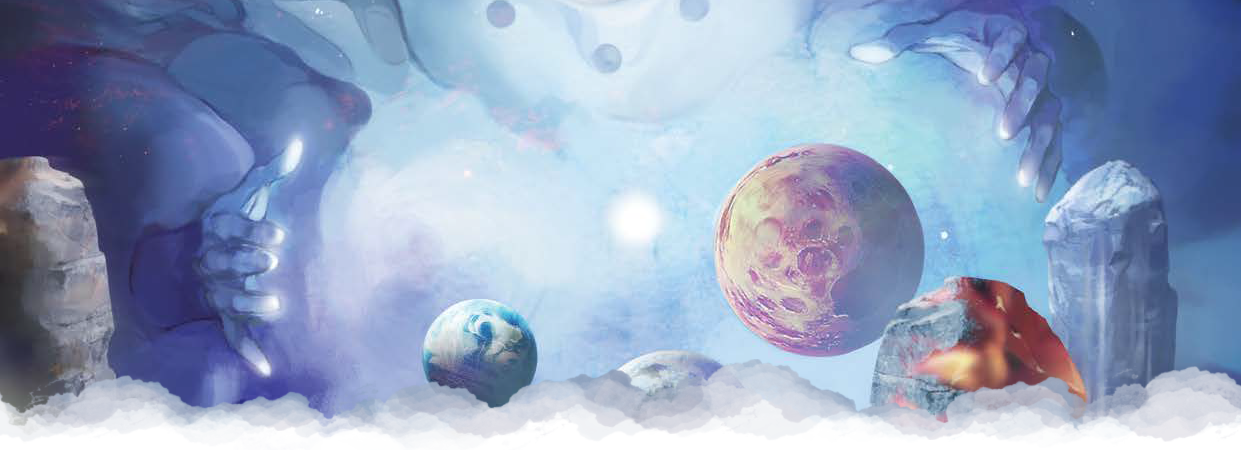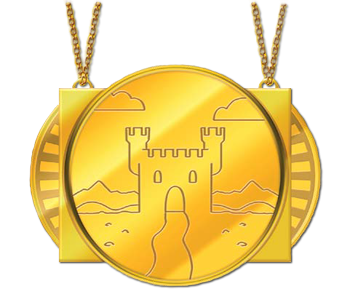Darmon
God of Travel, Wealth, and Joy
Darmon (DAR-mahn) is the chaotic good god of travelers, tricksters and rogues, joy, laughter, good fortune, trade, merchants, diplomacy, messengers, jesters, scouts, rebels, and thieves. He is associated with the fox, the otter, and the kestrel—the cleverest of beasts of land, water, and sky. He is also associated with the djinn, who were once among those div confined to the pillar of fire. Darmon once went to the fire pillar, and found those div of good heart who've been wrongly imprisoned. These he transported to the pillar of the air, where they rule to this day. These powerful beings love Darmon and are fond of his followers.
Darmon is called "many faced" because he has always disguised himself to walk among the mortal races. Every race shows him as one of their own in icons, generally as a very handsome young male with laughing eyes. He is always shown wearing golden laurels on his brow, bearing his short blade Laughter's Song, and wearing his cloak of the heavens.
Since Darmon has walked among the mortal races more than any other god, and in the early days could reveal himself when he did so, he is the most universally popular of the gods. All races engage in the crafts he taught them. If there is one race most fond of Darmon, though, it is the humans, who are most enamored with his ways.
Divine Domains
Travel, Trickery
Holy Books & Codes
The worshipers of Darmon do not engage in common prayers as most religions do. As the religion is based on the nearly limitless aphorisms of Darmon, their version of prayer usually involves the recitation of one such aphorism followed by vigorous debate—with one's self or others—about its meaning. Here are some sample sayings:
"Do not use three words when you need only one: 'Yes.'"
"We paint our houses different colors for a good reason."
"No number is the best. Three builds better than two, two loves better than one, one thinks better than three."
"Wait for the good, seek out the bad."
"A man is not a rocking horse."
"Wheat is better than dust, but dust is better than nothing."
"No matter what the wicked say, I always know my mother loves me."
"Do not seek what you do not want."
"There are twelve houses in the river. They will all sink in the end."
Divine Symbols & Sigils
Representational tokens for Darmon are extremely symbolic. A circle of gold, filled in, is all that is necessary to represent Darmon, and many merchants use this symbol to signify their trade. Those who wish to wear holy symbols of Darmon usually wear a large, round gold coin. When in haste, one need only paint a gold circle, though it is considered most fitting to fill it in.
Tenets of Faith
"Each one of us is as different as the many faces that adorn the coins of countless nations. To judge one man by the actions of another is as foolish as valuing one coin by the weight of another."When someone seeks advice from a high wayfarer, the response is often, "That is a very good question. What do you think is the right thing to do?" The Darmonites encourage free thought, self-reliance, and wit. Darmonites who are serious about the teachings of their god understand that life is too short to be miserable. Joy and laughter should fill one's days; mutual understanding and friendly debate are infinitely preferable to violence. They think of trade, diplomacy and the many other teachings of Darmon as the best ways to encounter as many cultures and people as possible. They crave new experiences, knowledge, and awareness. Slavish devotion to dogma is unheard of, and any who cling to doctrine would be subjects of scorn and ridicule. All of them agree: Darmon wants them to be free, happy, and prosperous. Beyond that, the faith is as varied as the Houses that observe it. If one were to try to categorize a universal Darmonite doctrine, it could best be described with four principles: debate, aphorisms, names, and freedom of organization.— High Wayfarer Vexx Dragonsaddler's interpretation of Darmon the Traveler's oft-recited statement, "I am not gold; I am more valuable yet."
Debate
The Darmonite faith is a constant quest for self-discovery and insights into the secrets of the spirit. On the surface, and as practiced by most causal participants, it is a simple religion that teaches mutual respect, love, joy, and freedom. Beneath that lies endless debates between its elder practitioners, in a quest to understand the countless teachings of Darmon of the Many Faces. Sometimes, learned members of the faith seem to enjoy thorny questions more than they do good answers, and one can commonly find a group of Darmonite elders debating some particularly obscure issues well into the night over many, many goblets of wine.Aphorisms
The Master of the Road had thousands of encounters with mortals before the Compact, and in each of them he offered mortals tidbits of advice meant to enlighten them on matters of trade, love, happiness, career, and piety. Many of these sayings were captured in writing, but serious Darmonites might debate their meaning for hours upon hours, endlessly discussing why the Lord of the Ways chose this word over that, this phrase instead of the other. It is this principle of the faith that most easily transfers from house to house. All Darmonites delight in learning a new saying of Darmon's, and discussing its meaning.Names
To better understand Darmon and his teachings, more mystically inclined Darmonites take new surnames at various times in their lives. These names are either based on or duplicates many of the names Darmon took while walking the earth. In her youth, Krys might be called Krys Boneblade because legends say Darmon called himself "the Blade of Bone" when he taught people how to fish. At some point in her life, Krys will learn why Darmon took that name—perhaps she sees a bone in an ancestor's skeleton that looks like a blade, and understands Darmon was saying that all things die, and we shouldn't fear the end. Perhaps she has some other epiphany, but whatever it is, she's learned something from that name, and now takes another.Freedom of Organization
Debate and taking on new names are important to most Darmonites, but not all. Many see the religion as a system by which to justify their poorly lived lives. Thieves often understand Darmon's teachings as "Have a good time, live out your passions, and die young." This completely misunderstands of the Champion of Heaven, but without any centralized authority, there is no one to crack down on such errors. Indeed, the freedom of the Houses to determine their own structures and beliefs is the very heart of the faith, but it means one is just as likely to find a high wayfarer who preaches, "The rich have had too much for too long, and it's time they get what's comin' to 'em," as one who says, "We are all us brothers, and should strive for joy and mutual benefit." The former is common in more chaotic locales (in the city of Freeport, for instance, Darmon's House worships him as the god of pirates), making Darmonite faith unpopular with authority figures.Holidays
The last day of the calendar year is one of enormous importance to the Darmonite faith, and is celebrated with an elaborate festival. Darmon taught the mortal races about time, and helped them set down their various methods for keeping it, so the last day of the year recalls this gift and others from the Master of the Road. A parade typically accompanies the festival, and children perform dances to commemorate Darmon's various gifts. Usually the people celebrate a gift of importance to their livelihoods; a seaside community might commemorate the gift of sailing, for instance.
Many of Darmon's gifts involved skills and practices for which he is not the god. He introduced the idea of crop rotation to the mortal races, but Rontra is the goddess of farming. Also, many communities who worship gods other than Darmon most of the year celebrate the Laughing God at its end. In small towns that lack a House of Darmon, the clergy of other churches organize these celebrations.
Divine Goals & Aspirations
Like his sister, Aymara, Darmon is a preternaturally happy god. He tells jokes in Heaven and when he walks among mortals, improves their lives with humorous japes and beautiful creations. However, his love of golden things and beautiful objects is irrepressible, and he has taught this love to the mortal races, calling the mercantile trades "the finest of the arts."
Darmon gave the mortal races many of the basic tools necessary for civilization: writing, keeping time, crop rotation, sailing, trade, riding, the making of compasses, and many other useful tracks and trades. He did this with his cousin Korak, who at the same time taught the mortal races useful skills such as sewing, weaving, making steel, and building arches. They did this out of love for mortals which has not diminished over the ages. Although Darmon delights in mischief, and is always happy to see horrible things happen to bad people (or even people who just think too much of themselves), he has never had a problem with mortals violating all sorts of laws. In his love for mortals, he would see them thrive.
Darmon wants a world free of stuffiness and useless restrictions. He wants to replace them with wealth, joy, good food, magnificent song, and, most of all, laughter. He's rarely serious, refusing to put away his tricks and fun, but when he is forced to abandon humor, his temper grows as fierce as his mother's, father's, and sister's. He sides with his parents in conflicts among the gods, but like the other young gods, he is less interested than his elders in such rivalries. He is endlessly inquisitive, loving to see and learn new things, but he prizes above all the freedom to travel and move.
Darmon is messenger of the gods, so he may venture into the mortal sphere to retrieve someone of importance, or deliver a divine decree. Although the Compact has made these occasions less frequent, Darmon is the god living mortals are most likely to meet.
Divine Classification
God of the Womb
Religions
Children
Remove these ads. Join the Worldbuilders Guild









